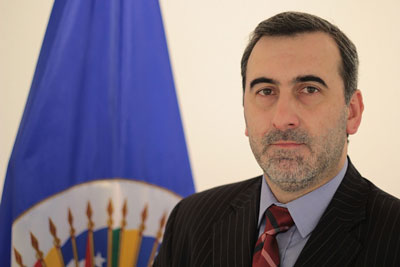The office of the special rapporteur for freedom of expression of the Inter-American Commission on Human Rights was created in 1997 to advance freedom of expression in the hemisphere, and over that period has contributed significantly to the protection and expansion of press freedom. So when Catalina Botero leaves the office in October, her successor–Edison Lanza, a Uruguayan lawyer, journalist, and free press advocate–will have big shoes to fill.
Lanza was selected on Wednesday by the IACHR, the rights monitoring arm of the Organization of American States (OAS). The commission was created in 1959 and composed of seven independent members elected by the OAS General Assembly. Lanza has been appointed for a three-year term and will take office on October 6.
The office has denounced government censorship, campaigned for the elimination of insult and defamation laws, promoted access to information, and emphasized the need to end impunity in crimes against the press. With the support of the human rights community and regional media, the position has stressed the importance of applying the highest international standards on freedom of expression, CPJ research shows.
Over the past three years, the special rapporteur has been under attack by a group of OAS member states, most of them with dismal press freedom records, who were angered by Botero’s criticism of their anti-press policies. The charge to weaken the office was led by Ecuador and the bloc known as the Bolivarian Alliance for the Americas or ALBA, which also includes Venezuela, Bolivia, Nicaragua, Cuba, and a few Caribbean nations.
Attempts to neutralize the work of the commission and dismantle its special rapporteur for freedom of expression have failed. The special rapporteur, whose rigorous reports have been key to highlighting press freedom conditions across the Americas, has staunchly defended the office with courage and determination and halted plans to tighten the office’s funding. Through intense and effective campaigning, Botero made a significant contribution to the advancement of press freedom in the hemisphere. It has been a privilege to work together during her two three-year terms.
Her successor was selected through a transparent and inclusive process, with 49 candidates for the post. Between late March and early April, during the period of sessions held at its Washington, D.C. headquarters, the commission selected six finalists and published their resumés on its website. The commission received comments from OAS member states and civil society groups, including international and regional human rights and press freedom groups.
CPJ and the Colombian-based Foundation for Press Freedom, known as FLIP, sent a letter to Emilio Alvarez Icaza, the commission’s executive secretary, emphasizing the need to preserve the rapporteur’s independence and financial autonomy, the two pillars that have made this office a significant player in the protection of freedom of expression throughout the hemisphere.
“Structural problems such as deadly violence against the press and the use of defamation laws to criminalize the dissemination of information will be an important part of the rapporteur’s agenda,” Lanza told CPJ on the phone from Washington. “But there are other challenges linked to how freedom of expression relates to other human rights, including the protection of children and adolescents, and gender,” he said.
Lanza, who has worked as a reporter for several Uruguayan media outlets, also served as a lawyer for the local journalist union and a consultant on free expression issues for international organizations (including UNESCO and the U.N. special rapporteur on freedom of expression). He is a well-known academic and has vast experience litigating in the Inter-American human rights system. He was instrumental in the drafting of Uruguay’s broadcast bill, aimed at regulating radio and television while fostering diverse and competitive media. The bill, currently under consideration in the Senate, could become a model for the region.
Botero, who will carry out her mandate until October, received high praise from the commission. In a statement, the IACHR recognized the work she has done “in the defense and protection of the right to freedom of expression,” and emphasized her “contribution to the progress made in the region through her effective leadership.”
ALBA’s attempts to weaken the office were countered by sustained efforts by international and regional human rights and press freedom groups, including CPJ, which campaigned to preserve the rapporteur’s independence and financial autonomy. But Ecuador and its allies will keep pushing for restrictive proposals in the future. “There is a lot at stake,” said José Miguel Vivanco, director of Human Rights Watch’s Americas division. “It is not only to seek a successor for Botero’s excellent performance, but the harsh work of containing the Bolivarian obsession to weaken institutions that challenge their policies.”
